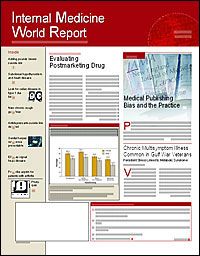Publication
Article
Internal Medicine World Report
Watchful Waiting vs Surgery for Inguinal Hernia
Author(s):
For years physicians and their patients have struggled with the decision of whether to undergo surgical repair for asymptomatic or minimally symptomatic inguinal hernia or to postpone surgery in favor of observation. New data (JAMA. 2006;295:285-292) show that men who are monitored by their physician do at least as well as those who opt for surgery.
The finding is from a first-of-its-kind study that compared men with inguinal hernia who immediately underwent surgery with men who were followed regularly by their primary care physician for at least 2.5 years.
Included were 720 men who were diagnosed with and treated for an inguinal hernia between January 1999 and December 2004 at 4 medical centers in the United States and Canada. The men were divided according to the 2 treatment options of observation (n = 364) or surgical repair (n = 356) and were followed for 2 to 4.5 years. Those in the observation group were examined by study surgeons 6 months after diagnosis and every year thereafter. Those in the surgery group were evaluated at 3 and 6 months after being diagnosed and annually thereafter. All participants were evaluated for any changes in the degree of pain caused by the hernia compared with the baseline physical component score of the Medical Out?comes Study Short-Form 36, Version 2 survey.
Pain or discomfort serious enough to interfere with usual activities occurred with equal frequency in both groups. Among men who chose observation, 5.1% de?veloped pain that limited their daily activities in the follow-up period. Among men who opted for immediate surgical repair, 2.2% had this level of pain (a nonsignificant difference).
"The most important message is that it is probably safe to observe a hernia," said investigator Robert J. Fitzgibbons, Jr, MD, FACS, Harry E. Stuckenhoff Professor of Surgery, Creighton Univer?sity, Omaha, Neb. "Surgeons have been taught and are still being taught that all inguinal hernias should be repaired at diagnosis to prevent the complication of something getting caught in the hernia and becoming strangulated....What this study would suggest is that it is reasonable to simply observe a totally asymptomatic hernia."
Physical function scores were similar in both groups and remained so at 2 years' follow-up. Hernia re?lated accidents were rare, occurring in only 2 men in the watchful waiting group over the 2 to 4.5 years of follow-up.
Key points
A comparison of treatment strategies, as in this study, is key for decision-making purposes.
In asymptomatic men, watchful waiting is a safe strategy.
Closely monitor pain level in men opting to postpone surgery.
Dr Fitzgibbons cautioned that men who choose to delay surgery should visit their physician annually, emphasizing the need to monitor pain intensity closely throughout life. "However, the incidence of major complications in this study was so low after 2 to 4 years in men who did not have symptoms, it's reasonable to assume that there won't be too many problems in the future."
In an accompanying editorial, David R. Flum, MD, MPH, of the University of Washington, Seattle, pointed out that this study might be challenging to interpret because nearly 1 in 4 patients in the group that postponed surgery crossed over to receive surgical repair within 2 years, and nearly one third had undergone repair by the time the study closed. In addition, 17% of those in the surgical repair group never had surgery. He stressed, however, that these facts should not diminish the importance of the data.
"The key here is that this study was not comparing 2 treatments, but rather 2 treatment strategies," he writes. "A study of treatment strategies is really what matters to clinicians and patients who are making decisions about how to manage this condition."






